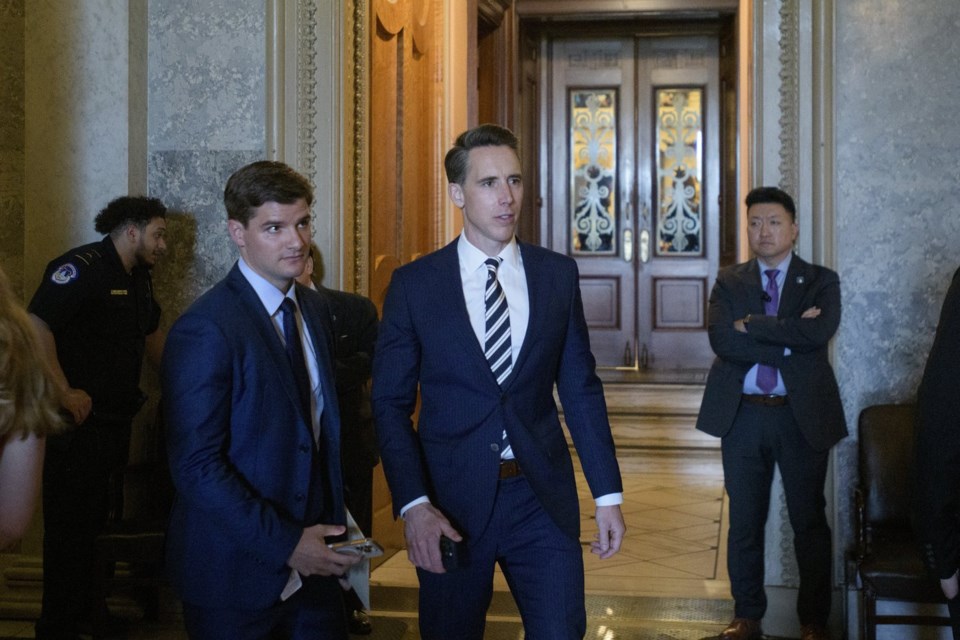WASHINGTON (AP) — President Donald Trump lashed out at Sen. Josh Hawley on Wednesday after the Republican's proposal to ban stock trading by members of Congress — and the president and vice president — won bipartisan approval to advance in a committee vote.
It’s the second time in as many days that Trump laid into senators in his own party as the president tries, sometimes without success, to publicly pressure them to fall in line. A day earlier, Trump tore into veteran GOP Sen. Chuck Grassley of Iowa over an obscure Senate procedure regarding nominations.
Trump called Hawley a “second-tier Senator” who was playing into the hands of Democrats.
“I don’t think real Republicans want to see their President, who has had unprecedented success, TARGETED, because of the 'whims' of a second-tier Senator named Josh Hawley!”
GOP senators had been working with the White House on the stock trade bill, and some supported a broad carve-out to exclude the president from the ban, but it failed, with Hawley joining Democrats to block it. Trump complained that Hawley joined with Democrats to block another amendment that would have investigated the stock trades of Democratic Rep. Nancy Pelosi, the speaker emerita, and her spouse. Paul Pelosi has been a much-watched trader, but Pelosi’s office said she personally does not own stock.
Hawley did not immediately respond to Trump’s post.
But Hawley’s legislation with the panel’s top Democrat, Sen. Gary Peters of Michigan, sailed out of the Senate Committee on Homeland Security and Governmental Affairs, after his support delivered a bipartisan vote over the objections of the other Republicans, who have majority control.
In a joint statement, Hawley and Peters said the legislation, called the Honest Act, builds on an earlier bill and would ban members of Congress, the president, vice president and their spouses from holding, buying or selling stock. An earlier proposal from Hawley had focused more narrowly on lawmakers.
“We have an opportunity here today to do something that the public has wanted to do for decades,” Hawley told the panel. “And that is to ban members of Congress from profiting on information that frankly only members of Congress have on the buying and selling of stock.”
Stock trading by members of Congress has long been an issue that the parties have tried to tackle, especially as some elected officials have become wealthy while in elected office. During the COVID-19 pandemic, in particular, it was disclosed that lawmakers were trading as information about the health crisis became known. Insider trading laws don’t always apply to the types of information lawmakers receive.
If the bill were to become law, it would immediately prohibit elected officials, including the president, from buying stocks and would ban them from selling stocks for 90 days after enactment. It also requires the elected officials to divest from all covered investments, but not until starting at the beginning of their next term in office — shielding Trump from that requirement.
During the committee hearing, tensions flared as Republicans sought other approaches.
GOP Sen. Rick Scott of Florida proposed one amendment that would exempt the president, the vice president, their spouses and dependent children from the legislation, and the other one that would have required a report on the Pelosi family's trades. Both were defeated, with Hawley joining the Democrats.
“We are one step closer to getting this bill passed into law and finally barring bad actors from taking advantage of their positions for their own financial gain,” Peters said in a statement.
Pelosi said she strongly supports the bill and looks forward to voting for it.
“The American people deserve confidence that their elected leaders are serving the public interest — not their personal portfolios,” she said.
She also gave nod to the dig in the initial Republican proposal — the Preventing Elected Leaders from Owning Securities and Investments, or Pelosi Act — which had focused more narrowly on the lawmakers.
One Republican, Sen. Ron Johnson of Wisconsin, said the overall bill is “legislative demagoguery.”
“We do have insider trading laws. We have financial disclosure. Trust me, we have financial disclosure,” Johnson said. “So I don’t see the necessity of this.”
Trump’s post criticizing Hawley comes after a similar blowback directed Tuesday night at Grassley.
In that post, Trump pressured Grassley to do away with the Senate's longtime “blue slip” custom that often forces bipartisan support on presidential nominations of federal judges. The practice requires both senators in a state to agree to push a nominee forward for a vote. Trump told Grassley to do away with the practice.
“Senator Grassley must step up,” Trump said, while claiming that he helped the senator, who was first elected in 1980, to win reelection.
Grassley earlier Wednesday said he was “offended” by what the president said.
___
Lisa Mascaro And Leah Askarinam, The Associated Press




